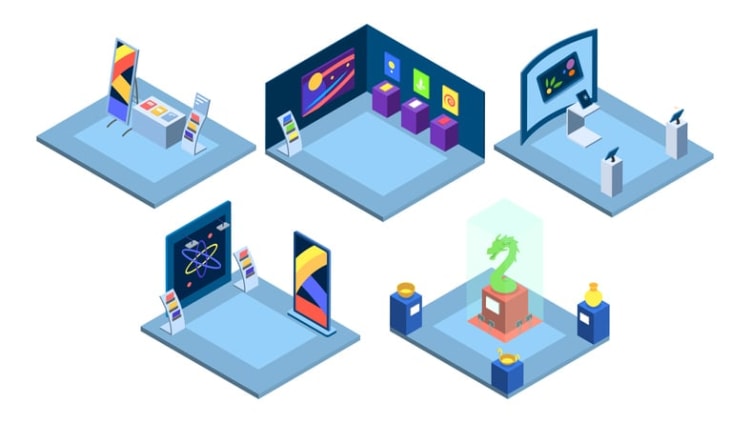In an ever-evolving world, virtual events have risen to prominence, offering unique opportunities for people to connect, learn, and engage, regardless of physical location. As we dive into the realm of types of virtual events, let’s explore the various formats and innovative ideas that can revolutionize the way we experience conferences, networking, fundraisers, and more.
Key takeaways
- Host virtual events to reach a global audience, provide interactive platforms for industry experts and attendees, and create engaging experiences.
- Leverage the power of social media to promote new products or fundraise for charity with exclusive offers & giveaways.
- Ensure success by providing post-event content such as recordings & presentations, facilitating meaningful connections through speed networking activities & one on one interviews, and exploring strategies for increasing engagement.
Virtual conferences and summits

Hosting large-scale events becomes economical and accessible with virtual conferences and summits. They allow participants worldwide to engage in keynote presentations, panel discussions, and networking opportunities.
With the ability to reach a global audience, event organizers can create a successful virtual event that rivals even the most well-attended physical event.
Keynote presentations
In a virtual conference, keynote presentations can be either live-streamed or pre-recorded, offering valuable insights and engaging content to the audience.
Prominent speakers and innovative event formats keep attendees captivated, motivating them to delve deeper into topics discussed during the keynote.
Panel discussions

Panel discussions in virtual events provide real-time interaction and debate among industry experts, fostering valuable insights and knowledge exchange.
Messaging features of virtual event platforms facilitate live Q&A sessions, and moderation tools guide the conversation in the desired direction.
Networking opportunities
Breakout rooms, chat functions, and interactive activities are effective tools to facilitate networking at virtual conferences, fostering meaningful connections among attendees.
Event organizers can demonstrate the effectiveness of the virtual event format and cultivate relationships that endure beyond the online event by providing a variety of networking opportunities.
Online trade shows and exhibitions

Online trade shows and exhibitions offer businesses the opportunity to showcase their products and services in a virtual environment. Some benefits of online trade shows include:
- Ability to create virtual booths
- Live chat functionality for real-time interaction with attendees
- Cost-efficiency compared to traditional physical events
- Accessibility for attendees from anywhere in the world
These features make online trade shows a valuable option for businesses looking to connect with their target audience and generate leads.
The virtual environment allows exhibitors to reach a wider audience, as virtual attendees can join from anywhere.
Virtual booths
Virtual booths in online trade shows empower exhibitors to:
- Display their products and services
- Invite attendees to explore and interact with the brand
- Draw potential customers
- Facilitate lead generation
- Contribute to a successful virtual event
Live chats and Q&A sessions
Live chats and Q&A sessions in virtual exhibitions foster real-time interaction between attendees and exhibitors, generating leads and forming connections. Businesses can increase their visibility, display their expertise, and establish enduring relationships with potential clients by providing a platform for immediate engagement.
Webinars and online workshops

Webinars and online workshops offer an interactive and accessible format for educational content. The incorporation of interactive features and provision of on-demand access allows attendees to immerse in the learning experience, acquire valuable knowledge and insight unconstrained by time or location.
Interactive features
Incorporating interactive features such as polls and quizzes into webinars and workshops can significantly enhance engagement and facilitate learning among attendees. Event organizers can craft memorable experiences with lasting impact on attendees by fostering audience participation.
The most innovative virtual events platforms employ spatial audio and interactive virtual furniture to facilitate increased networking and participation between attendees. Kumospace is the leading virtual events platform that offers industry leading interactive features.
On-demand access
On-demand access to webinar and workshop content offers several benefits.
- Attendees can revisit the material at their convenience, optimizing knowledge retention and compliance.
- Recordings and presentations made available online allow event organizers to broaden their content reach.
- Attendees can thoroughly absorb the presented information.
Virtual product launches

Virtual product launches offer a powerful platform for businesses to introduce new products, utilizing social media promotion and exclusive offers to create anticipation and excitement among their target audience. Utilizing the power of the virtual space enables businesses to effectively display their latest innovations, draw potential customers, and create brand buzz.
Social media promotion
Social media promotion plays a crucial role in virtual product launches, building anticipation and excitement among the target audience. Event organizers can successfully drive interest and engagement in their virtual event, ensuring a successful product launch, by leveraging various social media platforms such as:
- YouTube
By utilizing these platforms effectively, event organizers can reach a wider audience, generate buzz, and create a sense of anticipation for the virtual product launch.
Exclusive offers and giveaways
Exclusive offers and giveaways during virtual product launches serve as incentives for attendance and encourage sales, boosting the overall success of the event.
Event organizers can attract potential customers, create a sense of urgency, and ultimately drive conversions and brand loyalty by offering discounts, complimentary products, or other perks.
Hybrid events

Hybrid events combine the benefits of both in-person and virtual experiences, catering to a diverse range of attendee preferences. By offering live streaming and post-event content, hybrid events ensure that every participant can access valuable content and experiences, regardless of their location or preferred event format.
Live streaming
Live streaming of hybrid events allows remote attendees to participate in real-time, ensuring they don’t miss out on valuable content and experiences.
A seamless streaming experience allows event organizers to effectively engage and connect with their audience, regardless of their physical location.
Post-event content
Post-event content from hybrid events, such as recordings and presentations, can be made available online for attendees to access and review at their convenience. Offering this additional resource, event organizers can continue to deliver value and impact with their content long after the event’s conclusion.
Virtual networking events

Virtual networking events facilitate connections among attendees through various formats, such as speed networking and themed networking activities. By offering diverse and engaging interaction opportunities, a virtual networking event contributes to forging meaningful relationships and collaborations in a virtual setting.
Kumospace is the #1 virtual event platform for networking. It’s why its the go to product for organizations like NASA and Fortune 500 companies like Google.
Speed networking
Speed networking in virtual events enables attendees to engage in short, focused conversations with one another, fostering connections and potential collaborations.
This fast-paced and efficient networking format ensures that attendees have the chance to interact with a variety of individuals within a limited timeframe.
Themed networking activities
Themed networking activities in virtual events, such as virtual coffee breaks or game nights, can encourage engagement and interaction among attendees. A fun and relaxed networking environment aids event organizers in facilitating meaningful connections and helping attendees build enduring relationships.
Virtual job fairs

Virtual job fairs provide a convenient and efficient platform for employers and job seekers to connect, featuring one-on-one interviews and employer branding opportunities. Virtual job fairs streamline the hiring process and bridge the talent-opportunity gap by providing a space for job seekers to explore potential career opportunities and engage with employers.
One-on-one interviews
One-on-one interviews in virtual job fairs allow employers and job seekers to engage in focused conversations, streamlining the hiring process. A dedicated space for meaningful dialogue in virtual job fairs facilitates connections between employers and potential candidates, leading to successful recruitment outcomes.
Employer branding
Employer branding in virtual job fairs can be showcased through virtual booths and presentations, attracting potential candidates and promoting company culture.
Employers can effectively communicate their brand message and attract top talent in a virtual setting by highlighting their mission, values, and culture.
When planning a virtual event its important to pick a platform that allows for you fo fully customize your virtual networking space. Here is Kumospace’s virtual furniture catalog.
Online fundraisers and charity events

Online fundraisers and charity events offer a virtual platform for raising funds and awareness for various causes, featuring virtual auctions, raffles, and live performances.
Harnessing the power of virtual events allows organizers to engage supporters, generate contributions, and provide a captivating experience for attendees. By exploring various virtual event ideas, organizers can ensure a unique and memorable experience for all participants.
Virtual auctions and raffles
Virtual auctions and raffles in online fundraisers provide an engaging and interactive way for attendees to contribute to the cause while potentially winning prizes. Event organizers can spark excitement and encourage participation, driving fundraising success, by offering unique items and experiences for auction or raffle.
Livestream performances
Livestream performances in virtual charity events, such as concerts or comedy shows, can entertain attendees while raising funds and awareness for the cause. Captivating performances allow event organizers to create a memorable attendee experience while contributing to a meaningful cause.
Summary
As we’ve explored the various types of virtual events, it’s clear that this format offers countless opportunities for connection, engagement, and innovation. From virtual conferences and trade shows to online fundraisers and job fairs, the possibilities are endless. By embracing the potential of virtual events, we can continue to evolve, adapt, and thrive in an increasingly connected world.
Frequently Asked Questions
Events are physical occasions where people come together to experience something.
Virtual events, on the other hand, are digital experiences which take place online and involve people interacting virtually.
Digital events are static and non-participatory, while virtual events involve video or audio presentations with a platform for live interaction between the presenter and the participant.
Live interaction allows for a more engaging experience, as participants can ask questions and interact with the presenter in real-time. This creates a more dynamic and engaging atmosphere than a digital event.
Make your virtual event interesting by providing the latest information before, during, and after the event, playing media, customizing the user interface, and offering sponsors and exhibitors in-event expos.
You can make your virtual event stand out by providing the latest information before, during, and after the event. This can include playing media, customizing the user interface, and offering sponsors and exhibitors in-event expos. This will help to keep your audience engaged and make your event a success.
To structure a virtual event, you should start by setting goals and objectives, develop a concept and timeline, identify roles and target audience, create content, and choose a platform.
Additionally, it is important to consider the attendee’s needs, balance networking with content, engage the audience, have moderators, and troubleshoot in case of any issues.
Make your virtual event interactive by allocating virtual event space, organizing an agenda with live and on-demand content, incorporating interactive elements such as polls and Q&As, and using interactive virtual events platforms to create a fun learning experience and encourage voting.
Virtual events offer cost-efficiency, accessibility, and the ability to reach a wider audience compared to in-person events. They also provide unique opportunities for networking and engagement that may not be possible in a traditional event setting.
Incorporate interactive features such as polls, quizzes, and live chats to encourage audience participation and facilitate learning. Also, consider offering on-demand access to content so that attendees can review and engage with the material at their convenience.
Virtual conferences, webinars, online workshops, virtual networking events, and hybrid events are all examples of virtual event formats.
A virtual event is conducted entirely online, while a hybrid event combines elements of both in-person and online events, offering live streaming and post-event content to cater to diverse attendee preferences.
Here are the basics for organizing a great virtual event:
- Plan your event carefully
- Select a reliable virtual event platform
- Promote your event effectively to attract your target audience
- Incorporate interactive features
- Provide on-demand access to content
By following these steps, you can maximize attendee engagement and satisfaction. Here is a complete guide for planning a successful virtual event.





